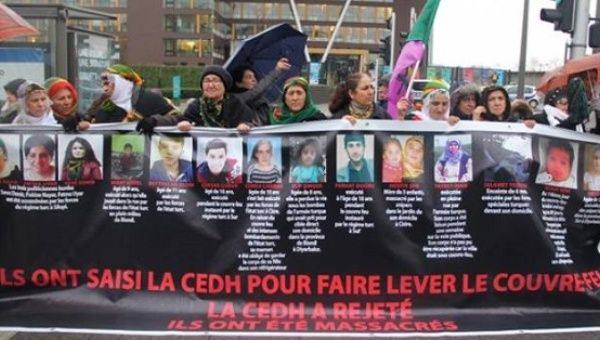A large minority in Turkey, at about 20% of the population, the Kurdish people have long faced systemic discrimination by the Turkish state. This has included massacres and violent repression of their culture, with even the Kurdish language banned until recently.
Such oppression led to the Kurdistan Workers’ Party (PKK) launching an armed struggle for national liberation in 1984. In recent years, the PKK — whose leader Abdullah Öcalan remains in solitary confinement in a Turkish jail — has declared its commitment to a peaceful solution to the conflict.


 Flag of PKK with image of Abdullah Ocalan.
Millions of Kurds view Abdullah Öcalan as their political representative. His freedom is directly linked to a democratic and peaceful solution to the war in Turkey.
Flag of PKK with image of Abdullah Ocalan.
Millions of Kurds view Abdullah Öcalan as their political representative. His freedom is directly linked to a democratic and peaceful solution to the war in Turkey.
 Kurdish women staged a sit-in in Strasbourg against the silence of European institutions over Turkey's crime
A coalition of pro-Kurdish European groups held a five day sit-in in front of European institutions in Strasbourg in eastern France, starting on February 23, to protest Europe's silence on the Turkish government's ongoing massacre of Kurds. The action targeted the European Court of Human Rights.
Kurdish women staged a sit-in in Strasbourg against the silence of European institutions over Turkey's crime
A coalition of pro-Kurdish European groups held a five day sit-in in front of European institutions in Strasbourg in eastern France, starting on February 23, to protest Europe's silence on the Turkish government's ongoing massacre of Kurds. The action targeted the European Court of Human Rights.
 Turkish police repress protests against Erdogan's renewed war.
The outcome of Turkey’s June 7 parliamentary elections promised so much.
Turkish police repress protests against Erdogan's renewed war.
The outcome of Turkey’s June 7 parliamentary elections promised so much.